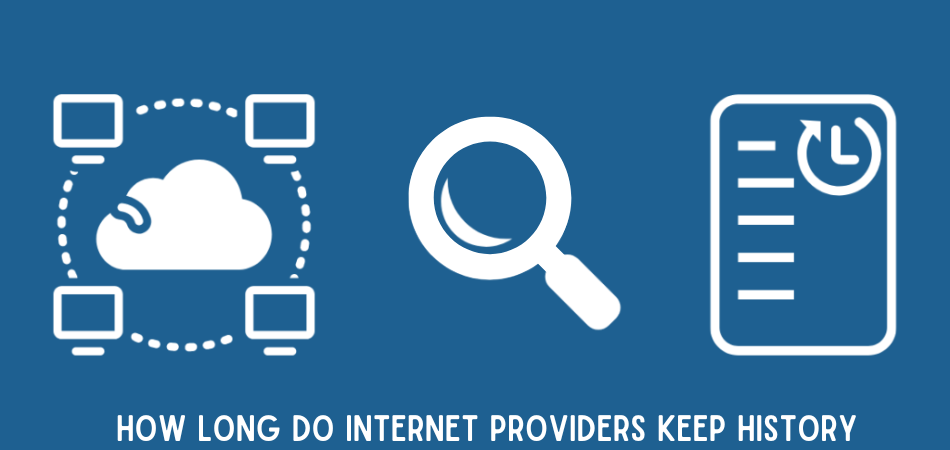It may surprise you that internet companies can see everything you do on the internet. They may monitor the websites you browse as well as the amount of time you stay on them. Regardless of how many security precautions you undertake, ISP providers may retain your history. So, how long do they keep your history?
The length of time your internet history is stored is determined by the country you live in. According to government regulation, in the United States, ISPs must maintain internet history for a minimum of 90 days. But, in other countries, this time can range from 6 months to even years.
Thus, this guide is for you if you are concerned about your privacy and want to know more about how long ISP has kept your history.
Key Facts
- Your Internet Service Provider (ISP) can keep your web surfing history for up to a year.
- ISP often sell your browsing data to marketing agencies.
- For investigation purposes, government agents can request browsing data from your ISP at any time.
- You can protect your internet surfing history from getting tracked by the use of private browsers and VPNs.
Can I Ask My Isp For Internet History?
The ISP normally will not provide you with your surfing history. Although your ISP does track your web activity, several ISPs will not share this data with you, even if you request it.
The websites you browse and the files you download are recorded by your network connection provider. Every ISP has a privacy policy that explains how customer data is handled, kept, and protected. Your internet usage is not private. Whatever your ISP can see is determined by the type of site you visit or whether or not it is secured via HTTP protocol.
Even if they track your history, they won’t usually provide it to you. However, you may always request the internet history from your ISP.
Why Do Internet Service Providers Keep People’s Browsing History?
There are many reasons why all ISPs keep people’s browsing history. We will discuss a few of these reasons in detail below.
- Money Income Source: Your surfing history is a source of money for ISPs. Many ISPs aggregate anonymous surfing records and sell them to marketing firms. Depending on your search history, marketing firms advertise items similar to your searches.
- Legal Reasons: For investigative purposes, the data can be collected and released to legal authorities like crime investigators or government entities. Tracking online users’ internet behavior can assist them in catching persons participating in criminal acts.
If you get a subpoena from Gov officials, your ISP is legally compelled to turn over any data they had upon you.
How Long Do Internet Providers Keep History?
Your region and country determine your ISP’s retention of your surfing history. The Electronic Communication Transactional Records Act of 1996 in the U.s mandates that ISPs must keep all client data for a minimum of 90 days.

In several other countries, the requirement to keep browsing history is much lengthier, spanning from 6 months to even more in certain regions. Even while ISPs can maintain billing information, it’s typical for them to destroy the majority of your history after this time.
Almost every ISP has a procedure in place that dictates what kind of data they will monitor and how long they will preserve browsing history.
How To Hide Browser History From ISP?
Whatever you do, the internet provider will be able to examine and trace your online history. This means you won’t be able to keep your web history hidden from your network provider.
Your network provider may know the pages you are visiting and when you access them. This type of data escapes through various routes, including the Ip of the web pages you visit.
You can, however, conceal or obfuscate your traces. So, let’s go through several methods you can try to hide your surfing history from your ISP.
Using Browser In Incognito Mode
When you use a private browser, such as incognito mode, your web browser will not keep data about the web you visit, nor would it instantly retain cookies, cache files, or credentials.

However, ISPs may still trace certain information from it. As a result, it is not as safe as you may assume, and for more private browsing, you will need to utilize a VPN.
VPN
Like ISPs, which are legally required to keep your data, the VPN service is not required to do so. If it is a trustworthy VPN, it must have a “no logging” guarantee, which means that it will store none of your no information.

Thus, government authorities are unable to monitor or obtain it. As soon as you log in to the VPN, it establishes an encrypted connection to your Internet network, enabling you to operate very securely as if you are using your own private IP address.
Your ISP cannot see your surfing history while using a VPN. However, in order to secure optimum privacy, you must subscribe to paid and premium VPNs, as free VPNs are ineffective.
Tor Browser
Tor (the onion route) is a web browser developed for anonymous internet browsing and traffic monitoring security. Tor browser is also a private browser.

However, unlike incognito mode, it encrypts the browsing records and data. Your data is routed through a network of Tor servers, rendering it considerably more difficult to track back to your computer.
Conclusion
ISP providers will track your data no matter what you do, as they are bound by Government laws to do. They can keep your surfing history from anywhere between 90 days to 1 year, depending on the country you are living in.
As news of data theft seems to circulate on a regular basis, more web users are becoming increasingly concerned about internet safety. Even though you delete your internet history repeatedly, it will almost definitely be saved somewhere else.
As a result, masking your data is critical to protecting your privacy. The good news is that you can conceal your data quite successfully using a variety of ways.
